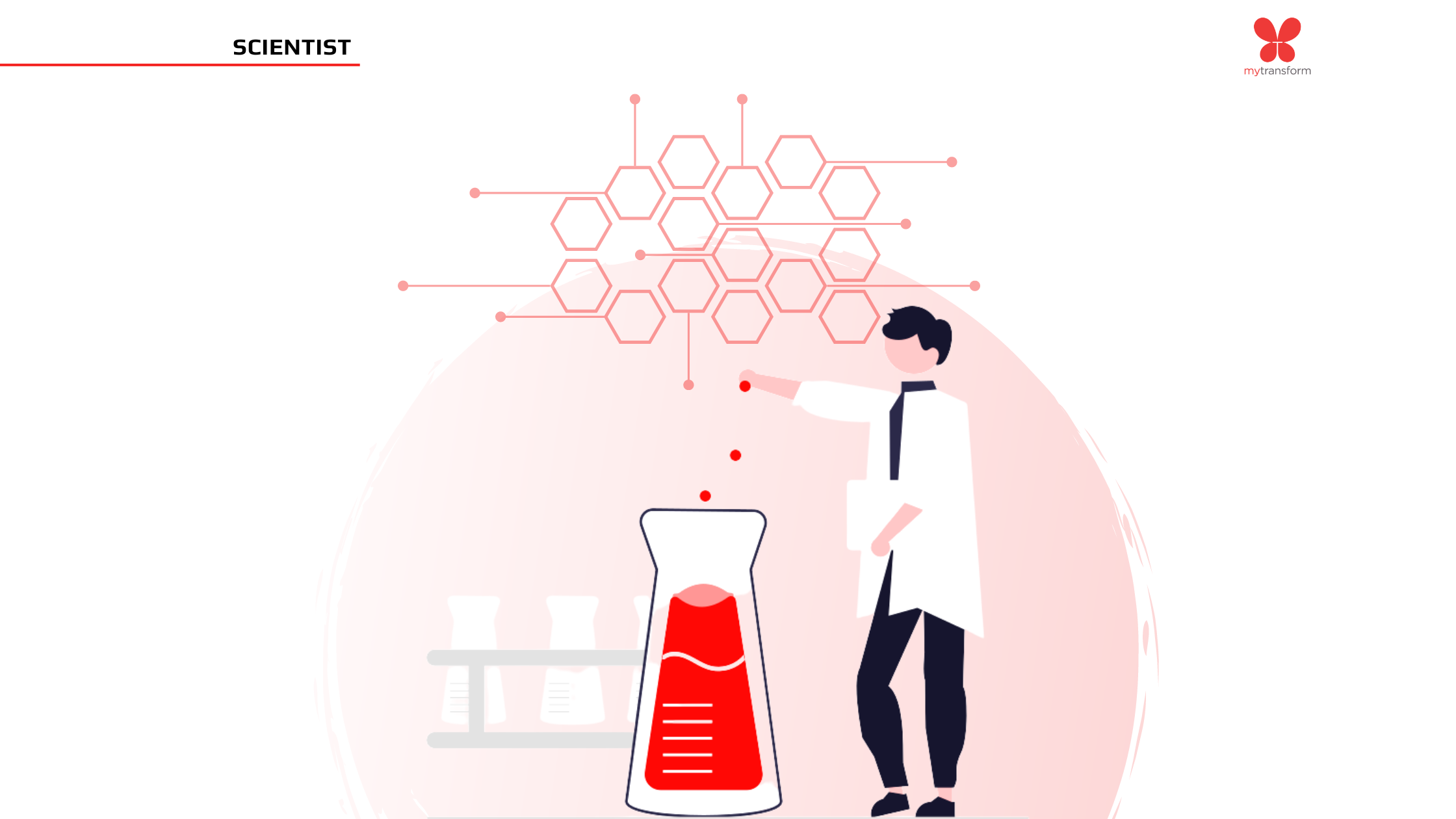
Scientists investigate the causes of what happens around us.
They explain how and why silk is soft. Why is the fire hot? How do we send a spaceship to the Moon and beyond? Why is the grass green?
All of these answers are the result of years of study and research. Interesting?
Do you want to learn how to become a scientist? Keep reading this article!
Who is a Scientist?
Scientists conduct studies, research, and experiments to develop new methods of doing things, such as a better way to kill cancer cells using radiation without harming healthy cells in the human body.
Through studies, research, and experiments, scientists create new things and applications, such as a bioengineered artificial limb, a new source of energy, new materials, new applications for humanoid robots, and so on.
Types of Scientists
The different types of Scientists are:
1. Biotechnologist
Biotechnologists use cellular and biomolecular processes to create new products or solve problems such as cancer cures, new medications, gene therapy, genetic testing, etc.
2. Botanists
Ecology botanists study the interactions of plants with other organisms and the environment. Other field botanists look for new species or conduct experiments to learn how plants grow in different environments.
3. Biophysicists
These scientists investigate the interactions of a cell’s various systems, such as DNA, RNA, and protein biosynthesis, as well as their interactions using physical science to study biological systems.
4. Agricultural Scientists
These scientists research commercial plants, animals, and cultivation techniques to improve farm yield productivity, and sustainability.
5. Archaeologists
Archaeology is the study of physical remains from the past in order to gain a broad and comprehensive understanding of human culture.
6. Astronomers
Astronomers are scientists who study planets, stars, and other celestial bodies.
7. Astrophysicists
Astrophysicists use physical laws to try to understand the universe and its contents, which include stars, planets, galaxies, and celestial objects.
8. Astrobiologists
They study the possibilities of life existing on other planets and discover that the biospheres of these worlds are distinct from that of Earth yet still have the capacity to support life.
9. Ecologists
Ecologists are scientists who investigate the connection that exists between living things and the environment in which they exist.
10. Evolutionary Biologists
Biologists who specialize in evolutionary biology research topics such as the origin of species from a common ancestor, and the ways in which species evolve, multiply, and diversify over time.
11. Immunologists
Researchers investigate the immune systems of all creatures that are alive today.
12. Marine Biologists
They are known as marine biologists, and their research focuses on the species that can be found in the ocean and other bodies of marine water.
13. Microbiologists
Microbiologists are scientists who study living things like bacteria, viruses, fungi, and protists. Other living things they study include protists.
14. Neuroscientists
Neuroscientists are experts in the field of studying how the neurological system works.
15. Ornithologists
Ornithology is a branch of zoology concerned with the “methodological study and subsequent knowledge of birds and everything related to them.”
16. Paleontologists
A paleontologist is a scientist who examines the history of life on Earth via the study of fossils. Paleontology is the study of the history of life.
17. Pathologists
Pathologists are experts who study the causes, effects, and progression of diseases and illnesses in the human body.
18. Zoologists
These scientists focus on animal behavior and environment, as well as the animal kingdom, animal categorization, and animal habits.
19. Geologists
Geology is the scientific study of the processes that occur on Earth. Geologists are scientists who research these processes.
20. Meteorologists
Researchers analyze how shifts in the composition of the Earth’s atmosphere influence the planet’s climate.
There are many types of scientists, this is just a part of the long list.
How do Scientist Works? (Roles and Responsibility)
The Roles and Responsibilities of a Scientist are:
-
- Planning and Carrying out Experiments
- Data Collection and Analysis
- Carrying out fieldwork, such as sample collection, presenting findings to senior/other research staff, and writing research papers, reports, reviews, and summaries
- Procedure Demonstration
- Putting together research proposals and funding applications/bids
- Supervising junior staff, including technicians.
- Product and materials testing
- Ensuring optimum quality standards
- Communicating with research and/or production staff
- Developing solutions to problems
- Staying updated with relevant scientific and technical developments
- Teaching the subordinates
Eligibility to become a Scientist
The eligibility criteria to become a Scientist are:
-
- Candidates must hold a Bachelor’s Degree from a reputable university or college.
-
- Graduation in the field of science is required.
-
- Candidates must have a graduation grade point average of at least 60%.
-
- Candidates for master’s degrees must have a minimum score of 65%.
Skills Required to Become a Scientist
The top 7 Skills required to become a scientist are:
-
- Critical Thinking and Problem-Solving
- Communication
- Business Acumen
- Self-Motivation
- Team Work
- Management Skills
- Adaptability
1. Critical Thinking and Problem-Solving
People who can solve problems quickly are valued in the biotechnology industry, which relies on innovation. The best scientists can identify and prioritize problems before focusing on finding the best solution.
2. Communication
Employees who can solve problems quickly are in high demand in the biotechnology industry, which is heavily reliant on innovation. Before focusing on the best solution, the best scientists can identify and prioritize problems.
Scientists must also improve their interpersonal communication skills, which are required when working with colleagues. These skills will be especially important when it comes to giving presentations, networking at industry conferences, and working in groups.
4. Business Acumen
While a strong technical background is essential, understanding the business of biotechnology beyond your day-to-day responsibilities is also essential.
Scientists should understand financial and regulatory changes that affect the sector, the broader business’s goals and challenges, and trends that may affect the industry’s and the company’s future.
5. Self-Motivation
Being motivated is an important part of being a successful scientist. Motivation comes from having a vision, setting goals, and celebrating small victories, but there’s more to it than that – there’s a science behind motivation.
6. Team Work
Biotechnology is an interdisciplinary field. Scientists must be able to collaborate with others and navigate conflicts and differences of opinion.
Being a team player also entails knowing when to take the reins as a leader and when to step back and let someone else lead.
7. Management Skills
Great scientists will demonstrate a wide range of management abilities. Not only is it critical to understand how to manage, store, visualize, and analyze large scientific data sets, but it is also critical to understand how to manage variables such as your time, your work, and a successful team.
8. Adaptability
Biotechnology is a fast-paced industry that is constantly evolving. Scientists must be adaptable and constantly update their knowledge, tools, and protocols. The more adaptable you are, the more successful you will be.
How to Become a Scientist in India? – Step-By-Step Guide
Follow the basic steps to become a scientist:
1. Get a Bachelor’s Degree
There are several prestigious institutes that provide undergraduate science and technology courses. These institutes frequently require you to pass the JEE (joint entrance examination).
Some institutes hold their own aptitude tests for admissions, while others prioritize board exam aggregate scores.
2. Complete a Master’s Degree
GATE (graduate aptitude test in engineering) scores are used to determine admission to most engineering colleges for postgraduate courses. Some institutes provide an integrated course that combines bachelor’s and master’s degree programs.
To pursue this program, you will most likely have to take an aptitude test or be admitted based on your performance in your bachelor’s degree program.
3. Get some work experience
You can work as a scientist or do internships for public or private organizations to become acquainted with the research settings and work culture associated with the field.
Consider publishing research papers and presenting your work at national and international conferences as part of your work experience. This can give you an advantage when applying for high-profile jobs.
4. Obtain a doctorate
A doctorate degree establishes you as a subject matter expert in your field of study. Completing a Ph.D. from a reputable institution can increase your chances of finding work.
Most Ph.D. programs prefer to admit candidates who have published research papers and a few years of relevant work experience.
Career Opportunities as a Scientist
Here are the top Career Opportunities As A Scientist:
1. Data Analyst
A data analyst gathers and organizes divergent data in order to produce a reliable result. They design and implement databases and data collection systems.
Their primary responsibility is to identify, analyze, and interpret data trends and patterns in large amounts of data. They use statistical techniques and various data analysis technologies to collect insightful data and develop business plans.
2. Geology
Geology is for those who are interested in rocks, the Earth, soil, and land. Geologists are scientists who study the Earth and soil.
These experts examine a region and forecast potential threats like earthquakes and volcanoes.
They create designs for builders and construction companies to build structures based on their research.
3. Astronomer
Astronomers study space structures such as stars, planets, galaxies, and black holes. They meticulously record and analyze data as they study the features, movements, and compositions of these items.
This is another science that necessitates the ability to perform complex mathematical calculations. Astronomers conduct research using telescopes and other ground-based and space-launched equipment, such as the Hubble Space Telescope.
4. Zoology
Zoology is a branch of biology that studies animals and animal life, studies animal anatomy, physiology, development, and categorization. A zoologist is a scientist who specializes in animal research.
5. Chemist
A chemist is a scientist who studies the properties and reactions of chemicals. They investigate a wide range of chemical substances, both organic and inorganic. They conduct experiments on chemical substances in order to better understand their behavior, create new compounds, or improve existing ones.
Their primary responsibilities include performing quality control checks on chemical experiments and reporting on test and analysis findings and conclusions.
6. Biotechnology
If you are interested in biology and are fascinated by the dynamics of technology, a Biotechnology course will pique your interest.
Furthermore, combining Nanotechnology and Biotechnology courses opens up numerous career opportunities, particularly in research and academia. A BSc in Biotechnology or a BTech in Biotechnology can help you advance in this field.
7. Atmospheric Researchers
Atmospheric scientists are experts who study the atmosphere to understand better and solve problems ranging from severe storms and air pollution to droughts and the effects of climate change.
Temperature, humidity, pressure, and wind speed are all collected by atmospheric scientists.
8. Geoscientists
Geoscientists study everything from how rocks are made to how earthquakes happen. Their work can range from theoretical studies to using their knowledge to find places to drill for oil.
Different kinds of geoscientists may have very different goals. Some people work to protect or improve the environment, while others search for oil or other natural resources.
9. Spacetech
The application of engineering principles to the design, development, manufacturing, and operation of equipment and systems for use in space travel and exploration is what is known as space technology, also referred to as space tech.
10. Physicist
Physics studies explored the properties of matter, energy, and time. A few physicists usually conduct additional theoretical research to learn more about how the universe actually works.
Others, on the other hand, conduct applied research in order to apply theoretical knowledge to actual processes or devices in order to improve the technology we use.
Top Scientist Recruiters in India
1. Deloitte
Since its founding in 1845, global consulting, financial advice, tax, audit, and enterprise risk services provider Deloitte has been a staple of the ‘Big Four’ associations. Data scientists at Deloitte engage in analytics initiatives ranging in scope and complexity.
A major part of their job is to help customers make sense of massive data sets by breaking them down into more manageable chunks. Do you get a kick out of simplifying complicated ideas? If so, you could fit in well with Deloitte in the role of Data Scientist.
2. LinkedIn
LinkedIn is a social networking service that allows its users to expand their professional network and is one of the most sought-after companies for data scientists.
If you can spend hours decoding hidden insights from large amounts of data in order to help businesses make better decisions, this is the role for you!
3. Accenture
Accenture is the place to be if you enjoy defining strategies and delivering on them through the creative use of integrated data. The well-known global professional services provider is always on the lookout for capable data scientists to join their team.
4. Flipkart
Because of the company’s growing scale of business and the increasing amount of data, Flipkart, another e-commerce behemoth, has a high demand for data scientists.
Flipkart’s data scientists work on key business insights to improve the Net Promoter Score. They generate and maintain data based on domain-specific information.
5. Sigmoid
Sigmoid is one of India’s fastest-growing product-based Big Data organizations.
It is aimed at assisting businesses in making data-driven decisions on a petabyte scale by providing quick insights. Sigmoid was founded in 2013 and quickly rose to prominence in the field of advanced analytics. Sequoia Capital, experienced experts, and counselors support it.
6. MuSigma
MuSigma is headquartered in Chicago, Illinois, and bills itself as the largest provider of decision science and analytics solutions. It has offices all over the world, with its main delivery hub in Bangalore.
As a Data Scientist at MuSigma, you would be responsible for analyzing data, refining and simplifying it, and finally evaluating the results. Sounds intriguing? Then you’re probably the right person for MuSigma’s analytics team!
7. Myntra
Myntra’s data scientists are in charge of measuring the company’s performance. They are also in charge of improving decision-making through the use of data science and advanced analytics.
Myntra may be the place for you if you enjoy classifying, segregating, and maintaining data.
8. Amazon
One of the world’s largest e-commerce companies is also one of the top data science recruiters. Amazon uses data scientists in India for a variety of core operations, including supply chain optimization, fraud, and fake review detection, multivariate testing, inventory, and sales forecasting, advertising optimization, and HR analytics, to name a few.
9. Citrix
This US-based multinational corporation provides a variety of services in India, including networking, cloud computing technology, and SaaS.
Citrix undertakes a number of data science projects in order to gain a competitive advantage in the market by using data to promote decision-making and predict outcomes.
10. Fractals Analysis
When it comes to analytics service providers, Fractal Analytics takes the top spot in India. Fractal has an overall impression of serving Fortune 500 organizations in industries such as innovation, retail, and insurance, to name a few.
If you are interested in providing custom-built analytics solutions for large aggregates across businesses, I am confident you will enjoy working with Fractal. Currently, the organization is actively recruiting data scientists for all its India offices.
Scientist Salary
| Scientist | ₹ 1,500,000 |
| Business Analyst | ₹ 800,000 |
| Consultant | ₹ 780,605 |
| Risk Analyst | ₹ 750,000 |
| Data Analyst | ₹ 750,000 |
| Professor | ₹ 626,400 |
| Technical Analyst | ₹ 600,000 |
| Analyst | ₹ 547,053 |
| Operations Analyst | ₹ 500,000 |
| Research Associate | ₹ 450,000 |
Pros & Cons of a Scientist
Pros of being a Scientist:
1. Innovation
Scientists are frequently given early access to new products, gadgets, and technologies before their creators make them public. This is because they are frequently involved in the process of developing new ideas and technology.
A scientist, for example, may assist in determining the safety and efficiency of solar-powered cars before inventors release them to the general public.
2. Huge Salary
Because of the enormous amount of effort and hard work required to become a scientist, the position is highly respected. This is also why scientists typically have high earning potential.
Many scientists can earn higher salaries as their careers progress. As a result, individuals seeking a job with high earning potential should consider a career in Science.
3. Contribute to the society
Scientists do a lot of research and experiments to help people understand the things they use every day, like metal or rubber. They do a lot of research to figure out how the materials in everyday products work, which helps them add safety information to the backs of those products.
Cons of being a Scientist:
1. Safety Issues
When scientists do a lot of experiments, they often run into safety hazards at work, like materials that give off dangerous particles. Most of the time, these scientists know the risks that come with handling different materials and properties.
Because they know about these risks, they can use their extensive knowledge of materials and how they interact with each other or how they behave in certain situations to make sure they are safe.
2. Long Hours at Work
A scientist often has to work long hours to do research and experiments. Even though the workdays can be long, they usually get paid well for what they do. A lot of their work involves learning new things about materials and making progress in their studies, which can make the long hours worth it.
3. Extensive Job Requirements
It can be difficult to get a job as a scientist. Since they work with so many different kinds of materials, they usually need a lot of training and experience.
There are a lot of great educational programs out there that can help you learn more about science. Getting this training and experience can help you prepare for your job as a scientist.
Future Scope as a Scientist in India
The field of science is an ever-growing one that will never be exhausted, and scientists are needed in every field in today’s world.
We have compiled a list of various industries in which the role of the scientist is critical, which will be listed below:
-
- Manufacturing Unit
- Animal Care Centers
- Research Institution/ Academic
- Defense Research Organization
- Mining Industry
- R&D Center of Medical Firms
- Pharmaceutical Industry
- Food & Beverage Industry
- Space Research Center
Summary
-
- Scientists conduct studies, research, and experiments to develop new methods of doing things, such as a better way to kill cancer cells using radiation without harming healthy cells in the human body.
-
- Types of Scientists: Biotechnologists, Botanists, Archaeologists, Ecologists, Marine Biologists, Neuroscientists, Paleontologists, and many more.
-
- The Roles and Responsibilities of a Scientist are:
-
- Planning and Carrying out Experiments
-
- Data Collection and Analysis
-
- Carrying out fieldwork, such as sample collection, presenting findings to senior/other research staff, and writing research papers, reports, reviews, and summaries
-
- To become a scientist, candidates must hold a Bachelor’s Degree from a reputable university or college.
-
- The top 7 Skills required to become a scientist are:
-
- Critical Thinking and Problem Solving
-
- Communication
-
- Business Acumen
-
- Self-Motivation
-
- Team Work
-
- Management Skills
-
- Adaptability
-
- The top 7 Skills required to become a scientist are:
-
- There are several prestigious institutes that provide undergraduate science and technology courses. These institutes frequently require you to pass the JEE (joint entrance examination).
-
- The field of science is an ever-growing one that will never be exhausted, and scientists are needed in every field in today’s world.
-
- Scientists are frequently given early access to new products, gadgets, and technologies before their creators make them public. This is because they are frequently involved in the process of developing new ideas and technology.
Frequently Asked Question
Candidates must hold a bachelor’s degree from a reputable university or college. Graduation in the field of science is required.
Candidates must have a graduation grade point average of at least 60%. Candidates for master’s degrees must have a minimum score of 65%.
The following are the basic requirements for becoming a scientist:
- Candidates must hold a bachelor’s degree from a reputable university or college.
- Graduation in the field of science is required.
- Candidates must have a graduation grade point average of at least 60%.
- Candidates for master’s degrees must have a minimum score of 65%.
- A doctorate degree can also be advantageous.
Scientists typically complete 4 years of undergrad, 5 years of higher education, and 3 years of research for a total of 12 years of training.
After completing your undergraduate education, you will most likely be given a stipend or paycheck to help you through the rest of your training.
Senior data scientists in India can expect to make upwards of ₹1,700,000 per year once they’ve acquired sufficient experience and expertise.
10 Best Bachelor of Science Degrees:
- Mathematics
- Chemistry
- Finance
- Psychology
- Business Administration
- Computer Science
- Information Technology
- Mechanical Engineering
- Biology
- Electrical Engineering
Indeed, pursuing a career in science in India is a promising path to take.
You may learn a lot and make a good living as a scientist by working for a reputable company like ISRO.
It all depends on the discipline you choose and how well you perform in that field.
For some, science is extremely difficult, so becoming a scientist would be difficult as well. Science comes naturally to some people, so it would be easier for them.
Highest Paying Science Jobs:
| Rank | Field | Average Salary |
| 1 | Biotechnology | ₹140,091 |
| 2 | Clinical Research | ₹139,434 |
| 3 | Genomics | ₹119,994 |
| 4 | Immunology | ₹103,159 |
| 5 | Genetics | ₹97,815 |
| 6 | Biochemistry | ₹97,142 |
| 7 | Chemistry | ₹93,100 |
| 8 | Microbiology | ₹89,312 |
| 9 | Molecular Biology | ₹86,328 |
| 10 | Oncology | ₹86,112 |
To become an ISRO space scientist, you must first complete an engineering or science program.
ISRO typically seeks professionals with a master’s degree in mechanical, electrical, or computer engineering, as well as a Ph.D. in Astronomy, Physics, or Mathematics.
To become a space scientist after graduating from high school, you must enroll in a university that offers a course in your chosen field and pass some entrance exams.
Later on, you will be required to complete a master’s degree in conjunction with your undergraduate studies.




